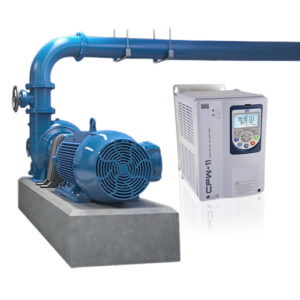Efficiency is not just a buzzword. For industrial businesses, improving the efficiency of electrical systems is crucial for reducing expenditure — particularly in an environment where the energy costs remain sky high. Here, David Strain, technical director of systems integrator, Technidrive, takes a deep dive into the energy savings potential of pumping applications.
When it comes to energy consumption, centrifugal pumps are among the guilty culprits. For sectors like oil, gas, water and wastewater treatment, pumps can consume more than 15 per cent of a facility’s total energy use. A common cause is the use of traditional fixed speed motors in pumping applications. Essentially, using a motor that runs consistently, regardless of the actual demand.

Variable control
For most industries, the demand for fluid flow varies over time. For instance, water treatment plants might experience lower demand during off-peak hours. Fixed-speed pumps are unable to adapt to these changes, leading to wasted energy and increased costs. To better manage energy consumption in pumps, installing a variable speed drive (VSD) is a no brainer.
A VSD’s core functionality lies in adjusting the frequency and voltage supplied to the motor, therefore enabling precise control over its rotational speed. This allows for variable control of output of the pump, meaning it never runs at full power unnecessarily. Moreover, many VSDs are now supplied with smart technologies that can collect and analyse data from the drive, motor and pump, allowing operators to monitor energy consumption in real-time.
These systems bring substantial benefits compared to soft starters — equipment that facilitates a gentle ramp-up of the motor speed during the start-up phase. Thanks to the ability to set specific parameters, VSDs are a far better option where energy savings are concerned.
Pump intelligence
Energy savings can also be made by deploying intelligent control software alongside a drive system. This technology can control pump performance through real-time monitoring and adjustments. Metrics such as pressure and flow are measured to ensure the pump speed adjusts correctly and efficiently.
Global motor and drive manufacturer and Technidrive partner, WEG, offers the Pump Genius platform for these applications. The system is available in three versions, Pump Genius Simplex, Multiplex and Multipump — each for a different scale of pumping operations. The tool enables a standard VSD to become dedicated for pumping systems and provides operators with greater opportunities for improving reliability and saving costs.
By equipping the inverter with intelligent features, the system can detect issues such as dry pumps and pump cavitation remotely. Upon identification, the drive sends an automated alert to the operator via the HMI and can shut down the motor if necessary. Likewise, the system can also react in instances of increased demand. Should an application require a larger pump, system can automatically instruct the jockey pump to pause to enable the larger pump to continue operations.
For systems operating multiple pumps, the Pump Genius Multiplex enables forced rotation to ensure equal use of all pumps on site. Not only does this improve overall efficiency, but reduces excessive wear and tear on individual pieces of equipment.
Maintenance
Following installation, the efficiency of a pump should also be monitored over time since its overall effectiveness is likely to reduce. Regular maintenance, such as identifying and addressing leaks, clogs and other issues promptly will ensure that the system is operating optimally. Again, using smart technologies to monitor the system digitally can give operators an insight into efficiency.
Another key advantage of WEG’s Pump Genius is its ability to perform some maintenance automatically. Cleaning of the impeller, also known as deragging, is particularly important in wastewater settings — both for pump efficiency, maintenance and spillage control.
With pumps consuming large volumes of energy use in industrial facilities, these systems should be a primary target for facilities managers hoping to improve efficiency and reduce costs. For a consultation on the energy saving opportunities of your pumping system, speak to the systems integrators at Technidrive. Visit www.technidrive.co.uk.







